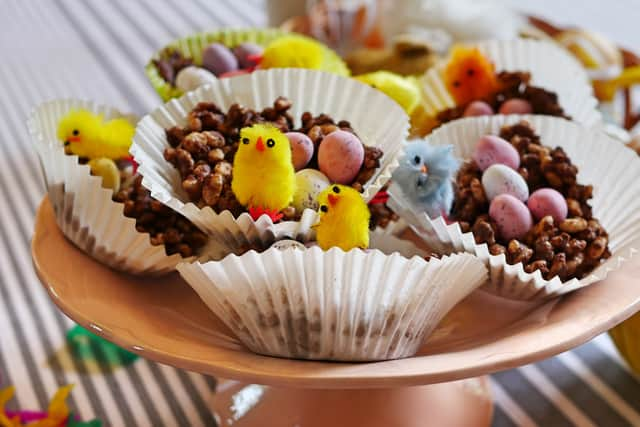Why do we eat Easter eggs? Reason we have chocolate eggs Easter 2023 -d what day to give them to people
and live on Freeview channel 276
The Easter holidays 2023 are here, with the UK set to bask in warm temperatures throughout the weekend.
The Christian religious festival marks the anniversary of Jesus Christ’s crucifixion and resurrection. Good Friday and Easter Monday are both bank holidays in the UK, although Easter Sunday typically forms the centrepiece of the celebration. The date on which these occasions fall changes every year.
Advertisement
Hide AdAdvertisement
Hide AdThere are many traditions at Easter time, with different countries marking the event in different ways. For example, Greek Orthodox Christians tend to hold their celebrations at a differentdate to Catholics and Protestants.
Here in the UK, the religious holiday is often dominated by foods, including fish and hot cross buns on Good Friday. But it also revolved around the giving and receiving of Easter eggs.
But why has chocolate become such a central part of Easter - and how did eggs become such a key feature of the religious event? Here’s what you need to know.
Why are eggs a symbol of Easter?
When gobbling up your Easter egg, it’s unlikely you’ll be thinking about anything other than chocolate. But there is an interesting reason for why the egg is associated with Easter.
Advertisement
Hide AdAdvertisement
Hide AdEggs - the animal ones at least - contain new life and can therefore be representative of rebirth. So, they were initially given and received as gifts to mark the arrival of spring - a tradition which merged into Easter over time.


With Christians not allowed to eat eggs and other fats during the fasting period of Lent, eating one on Easter Sunday was viewed as a special treat. Over time, the practice began to develop superstitions.
Eggs that chickens and other birds laid on Good Friday were said to turn into diamonds if you kept hold of them for 100 years - although this might have been down to a prankster who wanted to create a stink (both literally and metaphorically). And if your egg had a double yolk, it was believed you would soon become rich.
Some people even thought there were fertility and other health benefits if you cooked your eggs on Good Friday and then ate them on Easter Sunday. However, this slightly disgusting idea has never been scientifically proven.
Why do we eat chocolate Easter eggs?
Advertisement
Hide AdAdvertisement
Hide AdAs with most seasonal chocolate products, Easter eggs have only become popular relatively recently. But they do predate chocolate Advent calendars by around 100 years.
The first British chocolate egg was sold by Fry’s in 1873, with Cadbury’s launching its own version just two years later in 1875. Easter eggs were initially made using dark chocolate, and were fairly plain in their early years.
However, in 1897 Cadbury’s launched its Dairy Milk Chocolate for the first time - a recipe that soon made it into Easter eggs and proved popular. So popular, in fact, that milk chocolate has become the predominant flavour in modern Easter eggs. That’s if you opt for a ‘traditional’ Easter egg, of course.


You can now buy all kinds of Easter chocolates, like Cadbury Creme Eggs, Lindt bunnies and Percy Pig-shaped pink chocolate. And even non-food-related products have got into the act, with Easter egg beauty kits now the norm.
Advertisement
Hide AdAdvertisement
Hide AdTypically, families will give Easter eggs to each other on Easter Sunday - but this unofficial rule is generally only stuck to by those who have been fasting for Lent.
What other egg-related Easter traditions are there?
There are two other egg related traditions in the UK that have died out somewhat.
One is decorating boiled eggs by popping them in dye or painting them, before adding extra decorations like glitter or fake gems. Another is egg rolling - a game involving rolling decorated hard boiled eggs down a hill and seeing whose egg travels the furthest.


It’s still a feature of USA Easter celebrations - most notably at the annual White House Easter celebration - but only tends to be found in Preston, Lancashire here in the UK. Easter egg hunts are a more popular pursuit these days.
What is the Easter bunny?
Advertisement
Hide AdAdvertisement
Hide AdA key figure in any Easter egg hunt is the Easter bunny. The rabbit is said to hop into homes before Easter Sunday to hide Easter eggs, which children then have to find.
There are numerous theories behind what the origins of the Easter bunny are. One school of thought is that the rabbit comes from the ancient pagan festival of Eostre, which honoured the goddess of fertility and spring. Her animal symbol is believed to have been a rabbit.
Meanwhile, in America, some people believe that the Easter bunny was introduced in the 1700s by German immigrants in Pennsylvania. Their egg-laying hare, known as “Osterhase” or “Oschter Haws”, was said to lay colorful eggs as gifts to children who were well behaved.
Comment Guidelines
National World encourages reader discussion on our stories. User feedback, insights and back-and-forth exchanges add a rich layer of context to reporting. Please review our Community Guidelines before commenting.
